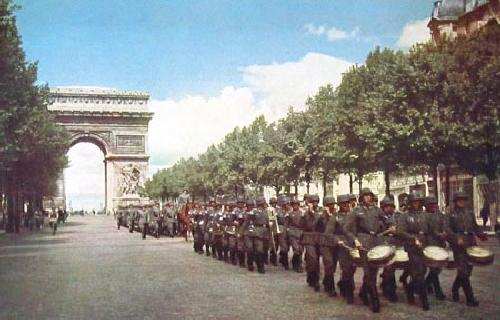
Jungen: Eure Welt: Choice of Topics (Volume V: 1942)

Figure 1.-- After the War began there is a great deal of attention focused on military topics and the world. The book included a full-color page of the Wehrmacht marching down the Champs Elysees in Paris. This was a very emotive scene. Germany had fought for over 4 years and lost hundreds of thousands of men trying to accomplish in World War I and Hitler had accomplished it in only a few weeks of fighting with very light losses.
|
|
These yearbooks had a strong military focus even before the War started. After the War began there is a great deal of attention focused on military topics and the world. The book included a full-color page of the Wehrmacht marching down the Champs Elysees in Paris. This was a very emotive scene. Germany had fought for over 4 years and lost hundreds of thousands of men trying to accomplish in World War I and Hitler had accomplished it in only a few weeks of fighting with very light losses. Other notable NAZI victories are recounted, such as Narvik (Norway), a battle the NAZIs almost lost. There is an article about Dunkirk (1940). It is described as a great victory. The defeat of France surely was a great victory. No where does the article suggest that allowing the British Army to escape had very substantial consequences for Germany. The swift Balkans campaign is also described in detail. Again the larger strategic consequences if delaying Barbarossa is not addressed. By the time these books were published, membership in the HJ was virtually compulsory so there are articlkes about the HJ, including one on the HJ war activities. In fact the HJ played a very important role in the War. There is an article about the The SS-Heimkehr Program". I am not famniliar with the program, but it appears to have been some kind of repatriaion program. Perhaps HBC readrs will know more. There is an curious article about the Stuka. It seems a strange choice because the Stuka was largely obsolete by 1940. After some disaterous engagements over England, it was withdrawn from the Battle of Britain. During Barbarossa it regained nbew life beccause the Luftwaffe destroyed the Red Air Force. Without fighters to contend with, it proved an effective tank destroyer. There were many more effective planes in service at the time. Presumably the Stuka was chosen because it was so well known. And there was an article about U-boats which by 1941 and the acquisition of French Atlantic ports was becoming the most pressing threat to the British. The chapter on Thailand was written by Ralph Colin Ross. He was a youth who in 1941 participated in Barbarossa and was killed in Russia.
HBC

Navigate the Boys' Historical Clothing Web Site:
[Return to Main "Jungend: Eure Welt" 1942 annual volume page]
[Return to Main German World War II home front page]
[Return to Main country homefront page]
[Return to Main World War II displaced children page]
[Introduction]
[Activities]
[Biographies]
[Chronology]
[Clothing styles]
[Countries]
[Bibliographies]
[Contributions]
[FAQs]
[Glossaries]
[Satellite sites]
[Tools]
[Boys' Clothing Home]
Created: 5:23 AM 12/31/2006
Last updated: 5:23 AM 12/31/2006



